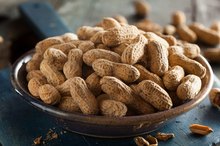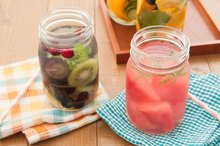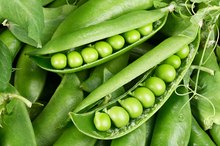What does fact checked mean?
At Healthfully, we strive to deliver objective content that is accurate and up-to-date. Our team periodically reviews articles in order to ensure content quality. The sources cited below consist of evidence from peer-reviewed journals, prominent medical organizations, academic associations, and government data.
The information contained on this site is for informational purposes only, and should not be used as a substitute for the advice of a professional health care provider. Please check with the appropriate physician regarding health questions and concerns. Although we strive to deliver accurate and up-to-date information, no guarantee to that effect is made.
Nutrition in Chocolate-Covered Raisins
Raisins are a good source of certain vitamins and minerals, which aren't lost when the raisins are coated in chocolate. The chocolate, while sweet and tasty, adds calories, fat and a load of sugar to the otherwise nutritious raisins. That doesn't mean you should never eat chocolate-covered raisins, but pleasing your tastebuds with the sugary treat on a regular basis might not be such a great idea.
Tips
Chocolate Covered Raisins has 436 Calories and 2.56 g of Protein per 100 gram serving according to the nutrition facts provided by the USDA Food Composition Database.
The Basics
A 1/4-cup serving of chocolate-covered raisins contains 176 calories and 7.4 grams of fat, 6.6 grams of which are saturated. According to the American Heart Association, you should limit your saturated fat intake to 7 percent or less of your total calorie intake for the day 2. This serving of chocolate-covered raisins clocks in at about one-third of that limit if you follow a 2,000-calorie diet. Too much saturated fat raises your bad cholesterol level.
- A 1/4-cup serving of chocolate-covered raisins contains 176 calories and 7.4 grams of fat, 6.6 grams of which are saturated.
- This serving of chocolate-covered raisins clocks in at about one-third of that limit if you follow a 2,000-calorie diet.
Mighty Minerals
Shelled Peanuts: Nutrition Facts
Learn More
A 1/4 cup of chocolate-covered raisins has 0.77 milligrams of iron. That translates to 10 percent of the 8 milligrams men need as part of their daily diet and 4 percent of the 18 milligrams women should have every day. Iron helps your body make energy. The same serving also contains zinc, which helps your body heal from injury, and potassium, which keeps your heart and muscles working normally.
- A 1/4 cup of chocolate-covered raisins has 0.77 milligrams of iron.
- The same serving also contains zinc, which helps your body heal from injury, and potassium, which keeps your heart and muscles working normally.
Vivacious Vitamins
You get much smaller amounts of vitamins in chocolate-covered raisins. A 1/4 cup of chocolate-covered raisins supplies about 1 percent of the 15 milligrams of vitamin E you need each day. Vitamin E helps your body use vitamin K and aids in red blood cell production, according to the University of Maryland Medical Center 345. Chocolate-covered raisins also supply tiny amounts of vitamins A and K.
- You get much smaller amounts of vitamins in chocolate-covered raisins.
Should You Eat Chocolate-Covered Raisins?
Do Cranberries Have Citric Acid?
Learn More
In addition to the large amount of saturated fat, chocolate-covered raisins contain an unhealthy amount of sugar, most of it added sugar in the chocolate. A 1/4-cup serving has about 28 grams of sugar. That's equivalent to 7 teaspoons of sugar, which is more than the daily 6-teaspoon limit recommended for women, according to the American Heart Association 2. And it's close to the 9 teaspoons men should limit themselves to each day. An occasional chocolate-covered raisin treat can be part of an otherwise healthy diet, but they don't deserve a regular spot in your healthy eating plan.
- In addition to the large amount of saturated fat, chocolate-covered raisins contain an unhealthy amount of sugar, most of it added sugar in the chocolate.
Related Articles
References
- USDA National Nutrient Database: Candies, Milk Chocolate Coated Raisins
- American Heart Association: Sugars and Carbohydrates
- University of Maryland Medical Center: Iron
- University of Maryland Medical Center: Zinc
- University of Maryland Medical Center: Potassium
- University of Maryland Medical Center: Vitamin E
- Raisins, dark, seedless. FoodData Central. U.S. Department of Agriculture. Published April 1, 2019.
- Grapes, american type (slip skin), raw. FoodData Central. U.S. Department of Agriculture. Published April 1, 2019.
- Fulgoni VL, Painter J, Carughi A. Association of raisin consumption with nutrient intake, diet quality, and health risk factors in US adults: National Health and Nutrition Examination Survey 2001-2012. Food Nutr Res. 2017;61(1):1378567. doi:10.1080/16546628.2017.1378567
- Painter JE, Waters AR. A review of the health benefits of raisins. J Food Sci. 2013;78 Suppl 1:ii-iii. doi:10.1111/1750-3841.12139
- Bell SJ. A review of dietary fiber and health: Focus on raisins. J Med Food. 2011;14(9):877-83. doi:10.1089/jmf.2010.0215
- Rietschier HL, Henagan TM, Earnest CP, Baker BL, Cortez CC, Stewart LK. Sun-dried raisins are a cost-effective alternative to Sports Jelly Beans in prolonged cycling. J Strength Cond Res. 2011;25(11):3150-6. doi:10.1519/JSC.0b013e31820f5089
- Wong A, Young DA, Emmanouil DE, Wong LM, Waters AR, Booth MT. Raisins and oral health. J Food Sci. 2013;78 Suppl 1:A26-9. doi:/10.1111/1750-3841.12152
- Chibuluzo S, Pitt T. Raisin allergy in an 8 year old patient. Allergy Asthma Clin Immunol. 2014;10(Suppl 2):A6. doi:10.1186/1710-1492-10-S2-A6
- Dreher ML. Whole fruits and fruit fiber emerging health effects. Nutrients. 2018;10(12):1833. doi:10.3390/nu10121833
Writer Bio
Sara Ipatenco has taught writing, health and nutrition. She started writing in 2007 and has been published in Teaching Tolerance magazine. Ipatenco holds a bachelor's degree and a master's degree in education, both from the University of Denver.








